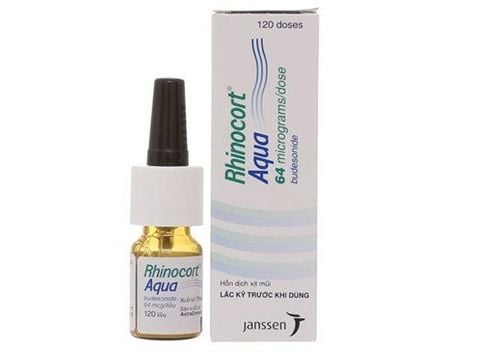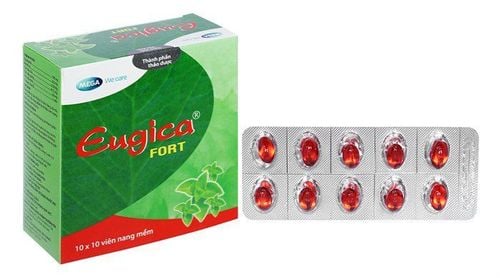This is an automatically translated article.
Zetonna is indicated for the relief of seasonal and year-round allergy symptoms such as itching, sneezing and runny nose. What are the uses of Zetona?1. What does Zetonna do?
Zetonna belongs to the group of corticosteroid medicines that are effective in relieving seasonal and year-round allergy symptoms such as nosebleeds, itching and sneezing. It works by reducing swelling and inflammation in the nasal passages. Besides the above uses, Zetonna may also be used to treat a number of other conditions that are not listed above. Therefore, consult your doctor before taking it for advice on how to use the drug effectively.2. How to use and dosage of Zetonna
Zetonna is in the form of a nasal spray. Before taking the medicine, blow your nose gently. Use Zetonna as directed by your doctor, usually once daily in both nostrils. Do not use more than 1 spray and one nostril daily, as this may increase the risk of side effects. Take your medicine regularly to get the best results, remember and use it at the same time each day.
Wipe your nose with a dry tissue. You may feel the effects of the medication within 2 days, but it may take 1-2 weeks for complete relief of symptoms. Tell your doctor if your condition does not improve.
3. Undesirable effects when using Zetonna
Some unwanted effects may occur when using Zetonna such as:
Dryness, nasal irritation Mild nosebleeds Serious side effects such as repeated nosebleeds, pain in the nose, hissing sound when breathing, eye pain, signs of infection such as white patches in the nose, sore throat, fever, etc. Corticosteroids can be absorbed into the bloodstream if inhaled. This can cause side effects of corticosteroids, especially in the case of long-term use and high doses. Some common symptoms such as unusual tiredness, weight loss, headache, swollen ankles, swollen feet, thirst, vision problems, etc. Serious allergic reactions can occur such as: rash, dizziness, difficulty breathing, itching, swelling of the face, tongue and throat,...
4. Notes when using Zetonna
Some notes during the use of Zetonna include:
The patient should inform the doctor about the history of hypersensitivity, allergy to Zetonna or any other allergies. Zetonna may contain inactive ingredients and could cause an allergic reaction or other serious problems. Report any medications you are taking including prescription drugs, over-the-counter medicines, herbs and supplements, foods, preservatives or dyes. Zetonna should be used with caution in patients with trauma, ulcers, nasopharyngeal surgery, infections such as tuberculosis, herpes eye infections, certain eye problems such as glaucoma, cataracts. , ... Avoid contact with patients with infections that can be spread to others such as chickenpox, measles, etc. Long-term corticosteroid therapy can make it difficult for the body to respond to physical stress. than. Before surgery or emergency treatment, or if you have a serious medical condition or injury, tell your doctor or dentist that you are using Zetonna or have used Zetonna within the past few months. . Although unlikely, Zetonna can temporarily slow a child's growth if used for a long time. So, see your doctor regularly so that your child's height can be checked. For pregnant and lactating women, consider carefully before using the drug. Discuss the risks and benefits of Zetonna with your doctor.
5. Drug interactions
Drug interactions may reduce the effect of Zetonna, or increase the effect of unwanted effects. Certain medicines should not be used at or around the time of treatment with Zetonna. However, in some other cases, two different drugs can be used together even if they can interact. In these cases the doctor needs to change the dosage or take other precautions. Therefore, let your doctor know what medicines and supplements you are taking.
6. How to store Zetonna
Store Zetonna in the following conditions:
Room temperature Avoid light Avoid wet places Do not store the medicine in a humid place or in the freezer Each different medicine will have different storage methods, because so read carefully the storage instructions for Zetonna on the packaging, or ask your pharmacist. Keep Zetonna out of the reach of children and family pets. When the medicine has expired or has been damaged and cannot be used anymore, dispose of the medicine according to the correct procedure. Do not arbitrarily dispose of Zetonna into an environment such as a water pipe or toilet unless requested to do so. Consult with your environmental waste company or pharmacist on how to safely dispose of Zetonna to help protect the environment.
In summary, Zetonna is indicated in the treatment of seasonal and year-round allergy symptoms such as itching, sneezing, runny nose. However, zimamox can cause some unwanted effects and drug interactions, so tell your doctor what medicines you are taking to reduce the risk of unwanted effects and at the same time increase the risk of side effects. effective for treatment.
Reference sources: drugs.com, webmd.com













